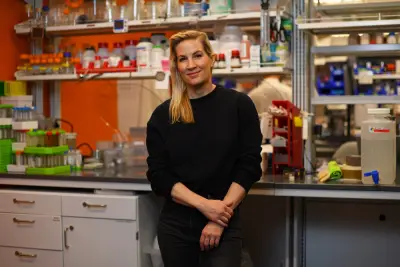The startup behind Shark Tank’s seaweed-based bacon

Fans of Shark Tank allegedly recall the episode with Umaro Foods a Berkeley company that makes vegan bacon out of seaweed Investor Robert Herjavec put a slice of the product in his mouth and promptly spit it out not into a napkin just on his plate with a loud ugh Beth Zotter CEO of Umaro recalls dying on the inside at that moment Oh yeah but I don t think it proved up in my expression she says Related Articles Ex-OpenAI workers ask California and Delaware AGs to block for-profit conversion of ChatGPT maker The European Union hits Apple and Meta with million euros in fines first under digital rules Musk says he ll dedicate more time to Tesla starting in May as company sees big drop in Q profit Google faces off with US governing body in attempt to break up company in search monopoly circumstance Big Tech s Magnificent Seven heads into earnings season reeling from Trump turbulence Zotter wound up having the last laugh on Shark Tank Mark Cuban liked the plant-based bacon and plopped down a million assets in Umaro which Zotter co-founded with plant biologist Amanda Stiles in By the company was gross-margin positive with million in annual-recurring revenue Nowadays you can find its applewood bacon in Whole Foods stores across California Even the NBA s Chris Paul a vegan is now an investor Seaweed might not be the first thing you think about sidling up on a plate with fried eggs and hash browns But it s high in protein one of fastest-growing plants on earth and requires no land fresh water or fertilizer As the world s food-supply chain gets ever-more stressed a effect of conditions change population progress unpopular tariffs and the like it s being seen as a viable future food in the vein of cell-cultured meat and cricket flour Umaro still makes bacon but its bigger business is refining seaweeds like kelp via a proprietary process into proteins and high-value ingredients Soon it might also move into biodegradable packaging Zotter just now took a inadequate minutes to chat about what s on the horizon Q What s the best way to describe what Umaro does A We re not a plant-based meat company We re a seaweed-refining company We figured out a way to unlock the individual molecules in seaweed for higher-value applications Our process definitely produces two products One is protein and the other is alginate Q What s the protein used for A What is really popular right now and I just don t see any signs of it abating is protein enrichment You see protein-enriched pastas and crackers so I m excited to work with partners who want to use this ingredient to make things like dumplings and noodles A lot of people are trying to get more protein into their diets sort of a impact of the GLP- and keto diets They re like If you re going to eat pasta at least get specific more protein in there and make it nutritionally balanced And the global territory of protein is about billion for protein ingredients isolates and concentrates Umaro Foods CEO Beth Zotter holds a container of kelp in her right hand and a container of kelp protein powder in her left while at Bakar BioEnginuity Hub amp Bakar Labs in Berkeley Calif on Monday March Umaro makes bacon and other products out of seaweed Jose Carlos Fajardo Bay Area News Group Q What s this alginate stuff A It s a specialty chemical worth a lot of money like a ton Alginate is usually added as an ingredient into things you wouldn t notice It s also used for the casings of sausages so it makes a good clear film I don t know if we ll truly get this grant or if it will be canceled by the current administration but we of late won an award from the Department of Force to use our alginate to make a biodegradable plastic film Our partner on that award is the San Leandro startup Sway Q Let s talk about your bacon because it s served in about restaurants nationwide including the Bay Area s Roam Artisan Burgers and people seem to enjoy it What makes it popular A Our innovation is that we ve used seaweed to encapsulate and contain a whole lot of fat There s a lot of really bad vegan bacon out there Majority of of the other products are sort of like soggy soy-based flab But we ve figured out a way to use seaweed gels to essentially make a solid crispy fat analog that delivers a lot of flavor because fat is where majority of of the flavor molecules hang out Q This is not a wellbeing food A It has a lot of fat like bacon but no cholesterol We do not try to say it s healthy It s just better than bacon It is shelf-stable because it has a low moisture content A lot of chefs really appreciate that they don t have to use cold storage for the products It s also easy to cook at two minutes in an air fryer so in terms of convenience that s another win Q Where do you see seaweed fitting in with the future of food A We see that environment change is driving major disruptions in water availability as the weather patterns change You ve got increasing droughts and increasing flooding coupled with extreme heat which puts even more water stress on crops That s just going to be even more of a vulnerability to the stability of our food supply Drawing more of our protein and macronutrients from the ocean is essentially a risk-mitigation strategy Q Is situation change a threat to seaweed farming A Rising sea temperatures are the biggest threats But like all the other crops there are major breeding programs in place to create temperature-tolerant strains of seaweed Q Where do you get the raw ingredients The California coastline Umaro Foods CEO Beth Zotter holds a package of Umaro bacon while at Bakar BioEnginuity Hub amp Bakar Labs in Berkeley Calif on Monday March Umaro makes bacon and other products out of seaweed Jose Carlos Fajardo Bay Area News Group A Seaweed is a very big industry in Asia and that s where we get it for now Eventually we would like to source from North America But right now the supply chain in Asia is much more mature and able to supply the volumes that we need to scale What s compelling about seaweed is that it s already a commodity It s already grown at commercial scale and large volume million tons a year What we re doing that no one else figured out how to do is to refine it into ingredients to allow it to be used in a much larger variety of food products Especially in the Western world particular people don t find seaweed very palatable so by separating it into its protein and other components we can more easily integrate it into food products Q It sounds nicer than eating insects at least A I do hope we re eating more cricket protein in the future In terms of consumer perception seaweed is considered to have a fitness halo so people feel healthy when they eat it So we have that going for us Beth Zotter Age Position Cofounder and CEO of Umaro FoodsEducation B A Harvard University in environmental science population approach M S UC Berkeley in potential and resourcesResidence Albany Five things about Beth She grew up in Fairfax Virginia She likes soccer and snowboarding plus surfing when she gets the chance She s vegetarian and doesn t like cooking Trader Joe s pre-cooked lentils are one of my go-tos She helped build a seaweed farm off the coast of Maine which survived -foot waves during a Nor easter She likes watching sci-fi shows like Black Mirror More and more I see reality replicating sci-fi so I ve become more of a sci-fi fan

